Pop Culture: The Fairy and the Woodcutter
by javabeans
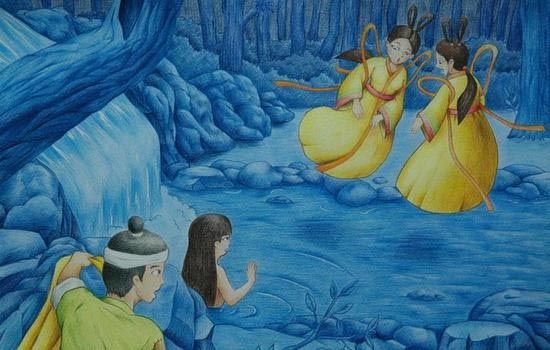
One of the reasons girlfriday and I wanted to open up the blog to this Pop Culture series is because we’d sometimes like to depart from the norm and muse about stuff. It allows us to take something from pop culture or society at large and run with it. Girlfriday took on the piggyback ride in her first entry, and I thought this would be the perfect occasion to bring up something that’s always struck me as odd and fascinating and disturbing: a particular fairy tale.
The catalyst for this post was a song by FT Island called “The Angel and the Woodcutter.” I had been listening to a lot of FT Island last year (blame You’re Beautiful) and one of their songs caught my attention because it was catchy and fun. But then I checked the title, and all of a sudden I felt conflicted.
You see, The Fairy and the Woodcutter is an old Korean fairy tale that many/most Korean kids grow up hearing, and even back as a child it had bothered me. I didn’t realize back then why, I only knew that it seemed really… wrong. But listening to FT Island’s song brought back all those early memories, and when I played the song back and listened to the lyrics closely, I remembered all those reasons I’d been so unsettled by the original fairy tale.
SONG OF THE DAY
FT Island – “천사와 나무꾼” (The Angel and the Woodcutter) [ Download ]
Audio clip: Adobe Flash Player (version 9 or above) is required to play this audio clip. Download the latest version here. You also need to have JavaScript enabled in your browser.
“The Angel and The Woodcutter”
You dazzle the eyes because you look like an angel
Your steps are light, like walking on clouds
You’ve come down from heaven for a short punishment
You’ve caught my eye, my heart feels it would stop
I want to hold on to you forever
Hiding behind you and secretly stealing glances
I am the woodcutterYou’re an angel only for me, a gift from heaven
Let’s be happy forever, the two of us
You’ll be my only love, I’ll always make you smile
I hope you’ll forget about heavenDon’t be sad
I feel uneasy that you’ll leave
My love must not be enough
If you want, I can do anything
Living only looking at you
I’m the woodcutterYou’re an angel only for me, a gift from heaven
Let’s be happy forever, the two of us
You’ll be my only love, I’ll always make you smile
I hope you’ll forget about heavenEven though time goes on, my love never changes
Till the moment I close my eyes, I’ll only look at youYou’re an angel only for me, my one and only love
I wish that we’ll live beautifully and happily, just the two of us
You’re my only love, there’s nothing to be sad about
Live with me in this place
I love you
I want to hide your winged clothes forever
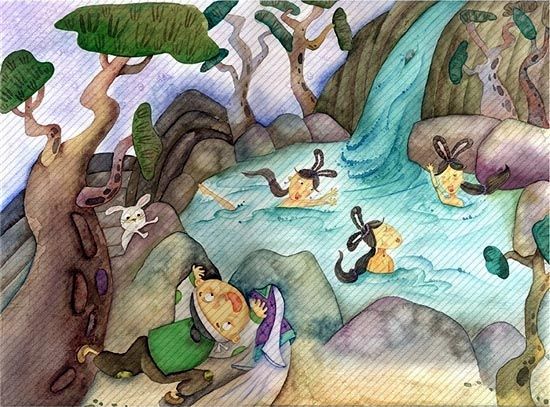
But before I get to the interpreting part, I’ve got to share with you the actual folk tale. Here’s a condensed version. (Note that this is in my own words, so don’t go around quoting it as the official story.)
There was once a poor woodcutter who lived in the mountains with his mother. One day he helped a wounded deer escape from a hunter, and in return for his kindness, the deer, who was actually a mountain spirit, granted him a wish. The man wished for a wife.
The deer told the woodcutter a surefire way to get his wish and outlined specific instructions. The woodcutter was to go to a mountain pond where fairies came down from their home in heaven once a month to bathe, aided by magical clothing that allowed them to fly. He was to steal one fairy’s clothing, stranding her in the pond, then offer to help her. If he brought her home, she would eventually fall in love with him and become his wife. The woodcutter must not reveal the truth about her clothing until she had borne him at least three children.
As ethics have no place in a love (or possession) story, the woodcutter did as ordered, and everything happened as the deer said. Hiding nearby, he watched as a group of fairies flew down from heaven and bathed, and stole one set of clothes. When it was time to return, one fairy couldn’t find her clothing, and her fellow fairies were forced to return to heaven without her.
The pervy woodcutter emerged from hiding to play the hero, offering her regular clothing and shelter. With no way to return home, in time she married him and bore him two children. And the woodcutter was happy. Selfish bastard.
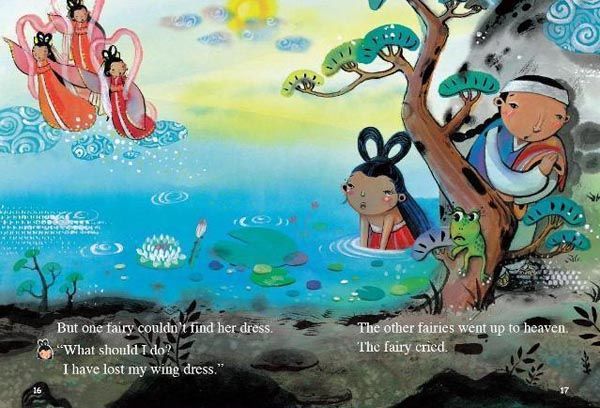
But once a month — on bathing day — his wife would feel homesick and cry for her lost life. And while the woodcutter was a scheming pervy jerk, he wasn’t completely heartless and finally decided that he would tell her the truth, figuring that her love for him would be enough, because they were an otherwise happy family. Let’s just say some people define happiness differently from others.
When he showed her the hidden clothing, the fairy put them on, took up one child in each arm, and flew up to heaven. And the idiot woodcutter was sad. Boo effin’ hoo.
The reason for the deer’s instructions now became clear — if he had waited until they had three children, the fairy would not be able to carry all her children up to heaven, nor would she be able to leave any behind. The deer saw that the man was heartbroken and offered him a solution. Thanks to Mr. Woodcutter’s security breach, ever since the fairy had been stranded on earth the other fairies had ceased bathing in the mountain pool. Instead, once a month they lowered a bucket to draw up water to heaven. It must not be much of a heaven if they’ve got no water up there. Just sayin’. The deer advised the man to get into the bucket, which would draw him up and therefore reunite him with his wife.
He did, and the family reunited. And they were happy.
Alas, his poor old mother had been left alone on earth, and after some time the woodcutter felt bad and wanted to see her one last time before she died. His wife appealed to the king of the heavens, because apparently all incompetent men are given three chances to prove their incompetence. The king offered the woodcutter a way to say his last goodbye, lending him a winged horse that would deliver him home. However, he must not get off the horse or he would be left behind.
The woodcutter did, and his old mother was overjoyed to see her son. She wanted to feed him, as all Korean mothers do, but he told her that he wouldn’t be able to get off the horse. So she offered to bring the bowl of freshly made gruel to him so that he could eat it here before leaving. However, the idiot woodcutter spilled the hot gruel on the horse’s back, and it reared up on its legs, knocking him off its back. The horse returned to heaven and the woodcutter died sad and alone. (And may or may not have turned into a rooster that crows his grief to the skies.)
The end.
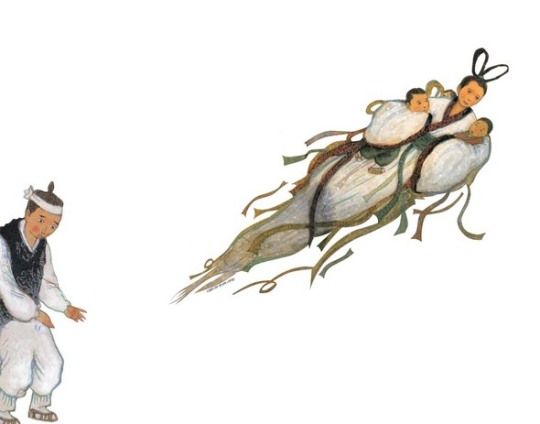
The song doesn’t have the same punch anymore, does it?
Don’t get me wrong, I’m not criticizing FT Island or the song. I like the song (with some reservation). It’s cute, and sorta interesting the way it extrapolates the woodcutter’s feelings to be a general love story — if you left out the references to the fairy tale, it could read like just another romantic pop song.
Can you see how my 6-year-old self was oddly uncomfortable with what is considered a perfectly ordinary bedtime tale before I even understand the words to describe what I was feeling? Perhaps one might argue that the kidnapping woodcutter died in the end, so it’s not like the story is holding him up as a role model. Only I’d disagree, because The Fairy and the Woodcutter isn’t told at bedtime as a cautionary tale; it’s just a story, like Cinderella. Sometimes the woodcutter is even painted in a sympathetic light — his rescue of the deer is highlighted, and he is described as a tragic victim of bad luck rather than his own stupidity.
Does a story HAVE to come with a morality clause? Perhaps not, but if bad behavior is depicted as the right course of action, the message becomes muddled. I doubt that this single story makes all Korean children grow up believing kidnapping is an effective method of courtship (although some dramas might have you scratching your head), but I think it’s problematic for fairy tales to put forth these behaviors and then treat them like there’s nothing wrong. It’s complicity by omission.
(Also note that I’m not saying Korean people are the only ones with messed-up folktales; there are a lot of Western fairy tales with arguably problematic messages, or at least motifs. It’s not a “this culture is better than that one” argument. I once had an English lesson wherein the teacher turned around the story of Jack and the Beanstalk to point out that the actual victim in the tale was the giant, and Jack was the jackass thief who invaded his home, stole his property, then cut down the beanstalk and killed him.)
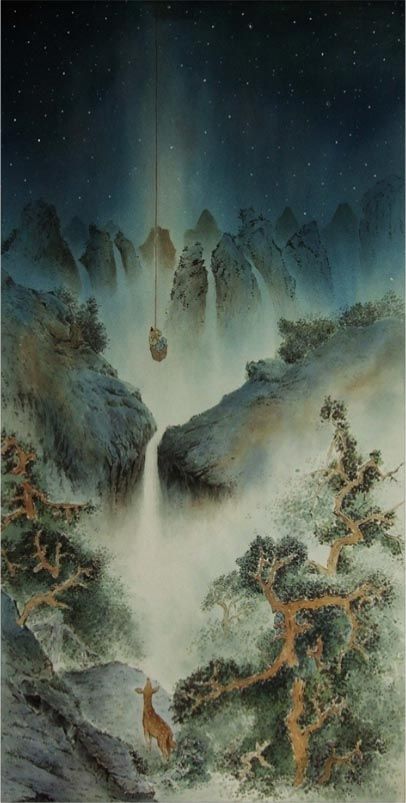
The Fairy and the Woodcutter glosses over the part where the woodcutter detains the woman against her will by means of subterfuge and deceit. In some versions he is even described as handsome, and a dutiful son. Because he is sanctioned by a heavenly agent (the deer, or mountain spirit), the story condones — approves, even — his methods and justifies the means for the sake of the ends. The story makes it a point to indicate that the wife wasn’t really unhappy with her life on earth — husband knows best! — but merely homesick. And that even when she left him to return home, she still loved him and was happy to be reunited with him in heaven.
Some of the same ideas are present in modern dramas — they aren’t limited to antiquated storytelling. Possessiveness is seen as bad when the possessive person is not part of the One True Pairing; then s/he is relegated to the role of the troublemaking second lead. But when possessiveness is displayed by the hero, isn’t it romantic? Isn’t it understandable, acceptable, even admirable when the hero goes to extreme lengths to make his relationship work? We as the audience put up with a lot of crap from heroes (and heroines, to be equal opportunity) when we know that ultimately they’re Meant To Be. Gu Jun-pyo, I’m looking at you and your wounded-little-boy charm. (And I say that as someone who totally loved his jealousy and misguided attempts to win Jan-di over in all the wrong ways.)
It’s interesting because there are themes in the tale that could actually encourage thoughtful discussion, but typically don’t. For instance, in this interspecies coupling, neither spouse is 100% happy despite a supposedly happy marriage with lovely children — the absence of family weighs heavily. This is also a theme we see frequently in dramas.
Now, the song I’d really like to hear is the one from the perspective of the poor manipulated and coerced fairy. Sure the tale says she eventually grew to love her woodcutter, but there’s a term for making the best of traumatic kidnapping, and that’s Stockholm Syndrome.
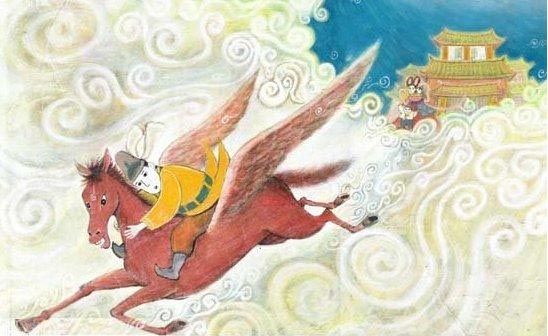
RELATED POSTS
Tags: song lyrics
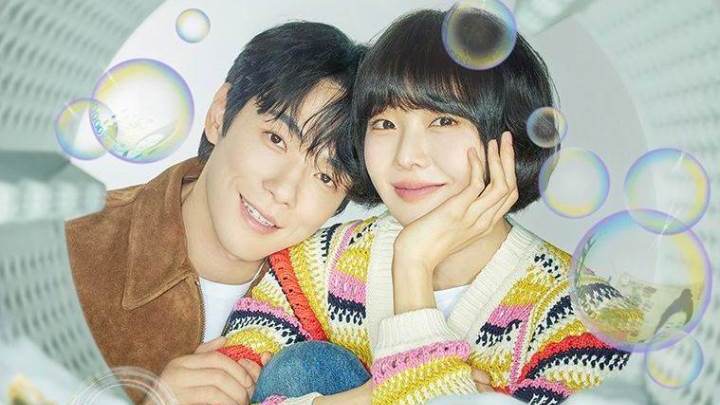







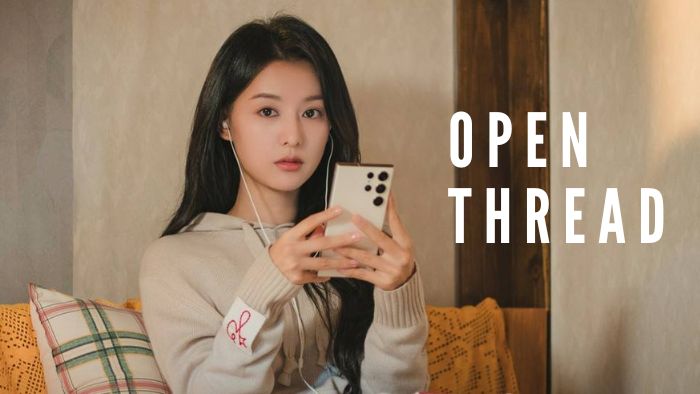

Required fields are marked *
Your email address will not be published. Required fields are marked *
101 HK
August 3, 2010 at 7:53 PM
I'd read this fairy tale long ago, and it's nice to revisit it. I guess the trapping aspect isn't supposed to be problematic since she's a fairy, not a human woman. Fairy tales and mythologies seem to depict capturing a non-human as a mate as somehow more acceptable -- perhaps because trickery is necessary to bring about a union that is, at its core, unnatural.
And being an unnatural union, one of the parties (usually the human) always does something to mess it up and bring it all to an end. No matter how much humans might want the magical and extraordinary, we can't deny our own natures and just follow the guidelines, no matter how clearly they're given to us. I saw this fairy tale as another version of the adage, "a fish and a bird may fall in love, but where would they live?" The woodcutter kept messing up his "marriage" because he couldn't deny his human sympathy and desire to please (for his wife, for his mother). And the fairy, upon being returned her clothes, followed her first instinct and returned to heaven with her children.
Required fields are marked *
102 MissChiVyus
August 4, 2010 at 7:37 PM
Haha. Your interpretation of the story cracked me up...=) On another note, I don't think she really experienced Stockholm Syndrome, since she viewed him as a kind stranger rather than a kidnapper.
I think there's a similar in Japan like this one. Btw, I think your version of the story beats the original.
Required fields are marked *
mmmmm6
September 20, 2023 at 4:08 PM
Some tellings of this story sympathize with the woodcutter and/or which I do not like. I've seen other tellings emphasize the fairy wanting to go back to heaven.
I found an animated version on YouTube that was the first episode of the Korean series. It showed when the fairy was with the woodcutter on Earth, and it showed her crying, mostly in the scene that comes right after she was trapped.
Required fields are marked *
mmmmm6
October 6, 2023 at 11:37 AM
I meant to say "and/or end with him going back to heaven"
Required fields are marked *
mmmmm6
October 6, 2023 at 11:41 AM
Also I found the video I was talking about
I found it
https://www.youtube.com/watch?v=6GeY6Uc0xoU
Something interesting I noticed in the comments was that so many people said that they used to feel sorry for the woodcutter as a child but now they feel sorry for the fairy as an adult.
Also I saw a few people describing the story as a cautionary tale for modern-day Korean men (woodcutters) who are trying to get Southeast Asian wives (fairies) through marriage brokers (deer).
Required fields are marked *
mmmmm6
October 6, 2023 at 11:43 AM
I've actually seen other people making that same comparsion.
Required fields are marked *
103 123BEE
August 5, 2010 at 4:56 PM
There's an old chinese movie from the 80's that adapted the fairy tale into a film called the Peacock Princess. It was a classic to my childhood however this one involves a prince and no kids, and rather than being homesick, the fairy is kicked out of the country by the people claiming that she is a witch while the prince was away at war. Although I believe it's a chinese movie, they are dressed like southeast asians or maybe a southern chinese ethnic tribe. It has everything that a kid would love from the early 80's asian film industry: music, dancing, bad CG, princesses, princes, animal friends, friendship, magic, etc.
http://www.youtube.com/watch?v=iWVCKsm-eQg
Required fields are marked *
104 ji
August 8, 2010 at 8:11 PM
Ahaha, i loved how you inserted little quips here and there in your retelling (stockholm syndrome, LOL!)
I remember not liking this story either, when I was kid. I read it in my church's library (my parents would only reiterate the foolish frog's son story at bedtime...). Except the story I read cut off at the happy reunion in heaven. Reading this just makes it seem even worse...
Required fields are marked *
mmmmm6
September 20, 2023 at 4:09 PM
I actually do not hate the story itself. I just hate the versions that treat it like a romance, sympathize with the woodcutter, and/or ESPECIALLY the ones that end with the woodcutter reuniting with the fairy in heaven.
Required fields are marked *
mmmmm6
September 20, 2023 at 4:40 PM
I've seen people argue that The Fairy and the Woodcutter has the moral of basically NOT doing what the woodcutter did. Also if you look at the Wikipedia page about swan maidens, it mentions that there are some versions of the story where the woodcutter is forced to perform tasks for the fairy and the children.
Required fields are marked *
105 cimmeriantwinkle
August 8, 2010 at 9:56 PM
OMG, this is so hilarious & witty, yet enlightening at the same time, love it. thanks javabeans=)
Required fields are marked *
106 l
August 14, 2010 at 11:46 PM
Neato! The Chinese have a similar story. I think the one narrated in this link http://www.chinavoc.com/festivals/double_seven.htm is closest to the version I grew up with. Interesting that it bothers you- it was one of my favorite storybooks...then again, it helps that I loved the pictures in my book and the fairy of Chinese lore is unambiguously happy in her marriage aaand she wasn't kidnapped. So I guess that there would effectively remove most of the uncomfortable bits and all that's left is the fairy getting her clothes stolen. ...well that sums up nicely...
Wanted to share that the story is referenced in Chinese pop culture too- http://www.youtube.com/watch?v=qt9akg1aGh0 (at 0:42). This was the very popular theme to a very popular drama that aired in 2004.
Thanks!!
Required fields are marked *
107 maya
August 31, 2010 at 8:24 AM
Thanks for sharing this, javabeans.
There is also a similar folk tale like this in Indonesia. About a guy who steal a look when the fairies are bathing in a pond AND also a fairy's clothes to keep her in earth with him. Not sure how the story ends though...
It's kinda disturbing how these folk tales are related to bathing scene when they are actually told as bedtime stories for the little children. Definitely not a PG-13 stuff!
Anyway, am definitely agree on how you relate the folk tale to the modern days. How distorted our views are when it comes to the OTP, when the male leads are being possesive towards the other female leads, I'd find it to be really romantic because that means that the male lead can't seem to let the female lead go and he will strive to keep her in his world, no matter what (hmmm.. <3). But when secondary characters show the same level of possessiveness, I'd find it dowright irritating. Guess I don't really like to have my OTP to be contended by other secondary characters...
Required fields are marked *
108 maya
August 31, 2010 at 9:01 AM
Thanks for sharing this, javabeans.
There is also a similar folk tale like this in Indonesia. About a guy who steal a look when the fairies are bathing in a pond AND also a fairy's clothes to keep her in earth with him. Not sure how the story ends though...
It's kinda disturbing how these folk tales are related to bathing scene when they are actually told as bedtime stories for the little children. Definitely not a PG-13 stuff!
Anyway, am definitely agree on how you relate the folk tale to the modern days. How distorted our views are when it comes to the OTP, when the male leads are being possesive towards the other female leads, I'd find it to be really romantic because that means that the male lead can't seem to let the female lead go and he will strive to keep her in his world, no matter what (hmmm.. <3). But when secondary characters display the same level of possessiveness, I'd find it dowright irritating. Guess I don't really like to have my OTP to be contended by other secondary characters...
Required fields are marked *
109 minnetter
September 22, 2010 at 8:44 PM
there's a japanese folk story very similar to this, and it's actually inspired a mangaka to draw a series with this similar story (in the japanese version fairy is called the tennyu- or celestial maiden and her celestial robe was robbed also by a pervy possessive jerk) and it's in the point of view of the reincarnation of that tennyu... the manga was drawn and written by Yuu Watase and is called Ayashi no ceres... It's actually pretty interesting and dark...
Required fields are marked *
110 T
September 23, 2010 at 11:29 AM
Very interesting! I think there is a Scotch? Irish? tale that is similar about a witch who fell in love with a Silkie ( man who has a seal skin that turns him into a seal). She saw him one day and fell in love with him so she waited until he fell asleep and took off his seal skin and became a man. She stole his seal skin and hid it. They fall in love and eventually marry and have children but, he is never quite happy always yearning for the sea. Until one day, he finds his seal skin and unable to fight his first love (the sea) leaves her for the oceans. Bereft and heartbroken she committs suicide by jumping into the ocean to be with her lovers...love...well, I think that's how it goes:)
Required fields are marked *
teleri
September 19, 2013 at 6:09 PM
I was going to point this out & saw this post :D This is sooo a Selkie story LOL These tales are universal
Required fields are marked *
111 pigshallfly
November 17, 2010 at 12:52 PM
hmm the pervy selfish incompetent bastard died alone and sad... seems like a happy ending to me :D
yes i remember reading this (or being read this) as a kid too, had many books with folk tales from around the world, and after revisiting them when I was a bit older I found something revolting in almost every one.
Folk tales (and fairy tales before they were sanitized for kids, though some even after) are all extremely disturbing, often as not harbouring violent, misogynist, cruel, selfish and calculating characters- and that's just the heroes.. ..no wonder everyone's childhood is so messed up huh..
so kdramas in presenting childhood traumas for every one of their significant characters isn't far wrong.. hmm.. o.O
Required fields are marked *
112 Ace
December 8, 2010 at 11:02 AM
I don't know where I was that I missed this post. ;) Interesting read, JB. Thanks!
Anyway, the first thing that came to my mind was Selkies (also known as silkies or selchies), mythological creatures found in Faroese, Icelandic, Irish, and Scottish folklore. Selkies are seals that can shed their skin to become humans and can return to seal form by putting it back on. Stories concerning selkies are generally romantic tragedies like The Secret of Roan Inish and Ondine. (In pop culture, see Nora Roberts' Face the Fire and Christina Dodd's A Well-Pleasured Gentleman)
Required fields are marked *
113 Jessi
February 7, 2011 at 9:27 PM
I heard the Irish selkie story as a kid and was disturbed by the man forcing her into marriage. In my story the selkie mother abandons her children as soon as she gets her skin back so it was terrible on that level as well.
Required fields are marked *
mmmmm6
September 20, 2023 at 4:12 PM
I heard the Korean version first. The selkie story always made me sad because she was trapped into a marriage but when she finally leaves it, she leaves her children behind.
Required fields are marked *
114 zaza
March 3, 2011 at 4:18 AM
in indonesia there's in Indonesia there is a similar story, about seven fairies who descended to earth to bathe in the waterfall, then there is a man who stole one of their shawls.
and the unhappy ending
story titled seventh fairies from heaven
Required fields are marked *
115 sweetomai
April 23, 2011 at 8:06 PM
i have always loved this song by f.t. island and was curious what the story was all about. thank you for explaining it!
Required fields are marked *
116 mel
August 4, 2011 at 10:39 AM
JB--in the just ended Kdrama The Thorn Birds, this was a recurring theme as to who was the "woodcutter" and who was the "fairy." ...and of course there was the question of who actually was the "thorn bird."
... be it fairy tale, Kdrama, any story... there is love or is it truly love or obsession, truth or deceit, selfishness or sacrifice..... in the end it's learning, what truly is the lesson to learn in fairy tales, dramas...
and as a child I couldn't get enough of any fairy tale, it was so fascinating to listen to radio dramas (battery operated) and read books and just listen to someone tell tales--in a time where there was no electricity so no tv--these stories were more vivid and true. It was so real and believable as any story can be when taken to heart and until now with the Kdramas available... it's always fascinating--thrilling to find what is the end, will it be happily ever after, does the evil stepmother or witch get it or will our heroine/hero suffer....
thanks JB for this blog on a fairy tale... I love how Hongki can be so deeply hypnotic when he sings with such a mature voice...
Required fields are marked *
117 MeeisLee
August 21, 2011 at 11:29 PM
Brought here from a link on your recent 1N2D recap.
Really interesting. I totally agree with your view on the glossed over parts and the toned down folk tales. It was to my surprise when I dissevered the original Little Mermaid story didn't have a happy ending like the Disney one. I kept wondering what Hyun Bin and Ha Ji Won's characters were talking about (in ref. to the disappearing bubbles) in Secret Garden. I wish there were more of these pop culture recaps.
Required fields are marked *
118 3kayt
December 17, 2011 at 11:04 PM
Same as Celtic selkies. Selkies are seals who took off their pelts and lay in the sun in human form. If you found one of their pelts and hid it, the selkie would stay by your side, but if they ever found their pelt again, they would leave. Slight difference is that in some versions Selkies have to leave if they find their pelts, even if they don't want to go. And there are few old Irish songs about fish turning into women who, upon being brought back to their home river dove back in and vanished forever.
Required fields are marked *
119 Min
March 30, 2012 at 3:53 PM
You do know that its pumpkin porridge, not gruel that the woodcutter spilled right?
I've got proof too:
The picture book version says it in TEXT
Required fields are marked *
120 catie chan
April 18, 2012 at 1:33 PM
i wonder why no one has asked...
Where did you get the pictures from? Such lovely artwork!
Required fields are marked *
121 sebsob
April 26, 2012 at 6:29 PM
"because apparently all incompetent men are given three chances to prove their incompetence."
Made my week! Hehe. Thank you!
Required fields are marked *
122 haricha
July 7, 2012 at 3:32 AM
Comment was deleted
Required fields are marked *
123 aurel lloyd
July 23, 2012 at 1:26 AM
hehe .. ^^
Required fields are marked *
124 Anne
July 30, 2012 at 9:47 AM
I realize that I am coming very late to this conversation, but this is my field so I thought I'd just comment belatedly (and probably without notice).
Two quick points:
all fairy tales are cautionary. They are
romantic, yes, but there is ugly darkness at the heart of
all romance and no fairy tale does half the job of obscuring it that any modern romatic story does. Most fairy tales are about how life is unfair, tragic and dangerous. Usually the happy ending comes at a terrible price: Cinderella, Snow White, Sleeping Beauty, Rapunzel, etc. wind up married to rich, handsome complete strangers as the best escape from unmerited hostility. And don't even get me started on Red Riding Hood or the Goose Girl.
And the Woodcutter/Fairy story, which has lots of analogs in lots of cultures (the fisherman & the mermaid, the selkies, etc) is in the same vein. In many ways, these
stories warn girls off marriage, reconcile them to not marrying. But, it is also the story of the fairy's triumph. Yes, she is a prisoner for years, but, unlike Cinderella or Snow White or any of the others, she escapes. She returns to herself and all attempts by her rapist to follow her are (finally) unsuccessful. This is a story of her victory.
Required fields are marked *
mmmmm6
September 20, 2023 at 4:16 PM
Comment was deleted
Required fields are marked *
mmmmm6
October 2, 2023 at 3:30 PM
I was never actually bothered by the story itself. I am only bothered by the versions that try to sympathize with the woodcutter (which is not all of them btw).
Required fields are marked *
mmmmm6
October 6, 2023 at 12:24 PM
You can translate this page to see more versions of the story
https://namu.wiki/w/%EC%84%A0%EB%85%80%EC%99%80%20%EB%82%98%EB%AC%B4%EA%BE%BC
Required fields are marked *
125 Germaine
August 11, 2012 at 10:41 PM
Since various posters have reported the same tale appearing in Chinese, Japanese, Indonesian and Cambodian folklore, I'm surprised no one has brought up the work of Joseph Campbell. He is famous for popularising comparative mythology and the idea that the common elements in folklore across the world are inspired by human impulses that are fundamental to us, and shared by everyone.
The Fairy and Woodcutter story is about our desire for a mate and procreation. This is a need so strong that our moral compass bends to allow theft and subterfuge to satisfy it. The story also tells us that we have a bond with parents and siblings that is so strong that we can abandon mate and children.
In short, folktales are twisted because we are. Lets's think about that a bit more as we lap up the next kdrama romance.
Also check out the new sit-com based on this fairy tale. Sent From Heaven is about the fairy and her mother adjusting to life on earth after they get stranded. It is 100 episodes long so. The few episodes I did watch were silly and funny.
Korean title: I Need A Fairy 선녀가 필요해.
Required fields are marked *
126 Mac
September 26, 2012 at 5:49 PM
Sounds like the selkie tale -- shapeshifting Irish creature, takes off its seakskin to sunbathe and becomes a beautiful maiden, beachdweller steals her skin and hides it in the rafters or roof thatch -- years later one of their children finds a "leather coat" hidden in the roof and tells his parents, and Mom sneaks off that night, reclaims her skin and skedaddles, without kids. (I've never heard of the kids being taken along, though sometimes the selkie loves the kids enough to visit them.)
I think there were cultures where bride-kidnapping was just what everyone did, and the girls in question were acculturated to believe that if the potential husband wasn't ballsy or crafty enough to execute an effective kidnapping, he'd be a weakling husband and not worth having. Some kidnappings were even "arranged" by lovers beforehand.
On the other hand, I attended a conference recently about women in the Tibet/Nepal area who were still suffering bridal kidnappings today (2000's), and their testimonies
That said,
Required fields are marked *
127 Mac
September 26, 2012 at 5:52 PM
Sounds like the selkie tale -- shapeshifting Irish creature, takes off its seakskin to sunbathe and becomes a beautiful maiden, beachdweller steals her skin and hides it in the rafters or roof thatch -- years later one of their children finds a "leather coat" hidden in the roof and tells his parents, and Mom sneaks off that night, reclaims her skin and skedaddles, without kids. (I've never heard of the kids being taken along, though sometimes the selkie loves the kids enough to visit them.)
I think there were cultures where bride-kidnapping was just what everyone did, and the girls in question were acculturated to believe that if the potential husband wasn't ballsy or crafty enough to execute an effective kidnapping, he'd be a weakling husband and not worth having. Some kidnappings were even "arranged" by lovers beforehand.
On the other hand, I attended a conference recently about women in the Tibet/Nepal area who were still suffering bridal kidnappings today (2000's), and their testimonies were not happy and shining.
I don't see the problem with recounting fairly tales such as these, as long as we can also have great posts and discussions like these as well -- we can understand the cultures they came from, but also understand why we prefer our modern sensibilities and ideas of women's equality and rights! (And although my K-drama love is undiminished, I could do with less wrist-grabbing and shoving women into cars, really I could.)
Required fields are marked *
128 Mac
September 26, 2012 at 5:53 PM
Sorry for the double (well, triple now) post!! Something weird happened with my browser!
Required fields are marked *
129 Hilary
October 18, 2012 at 3:06 AM
This is almost the same story as highlighted in "The Secret of Roan Inish"-an Irish children's book made into a movie:
"The story is told from the point-of-view of Fiona — played by Jeni Courtney — a young girl who is sent to live with her grandparents in an Irish fishing village.
Her grandfather weaves tall tales about the family's evacuation from their home on the tiny island of Roan Inish and his great-great grandfather, who once cheated death at the hands of the sea.
As she meets other villagers, Fiona hears more personal stories about an ancestor who married a beautiful, part-human/part-seal, and more about how the sea stole her baby brother during the departure from Roan Inish.
Later, Fiona believes that she has found Jamie romping in the grass on Roan Inish, and she must convince the family of her vision."-Wikipedia
A Selkie can shed her seal skin and become a woman. However, if a man can capture the skin the Selkie must remain a woman. At least this was the plot in the movie when an ancestor stole the skin of a Selkie, and hid it in the attic of his house because I guess that's okay if he's seen the most beautiful woman ever. He does so, and they get married and have children. One day one of the kids tells the Selkie mother where to find her seal skin (kid wasn't really planning this but just reporting that there was a seal skin in the house, and why in the world was Dad keeping it?). Off she goes back into the water, because the call of the sea is too much for a Selkie once she has her seal skin back. Even the ties of blood can't keep her from it.
Wow, myths are pretty pervasive aren't they? Joseph Campbell and Carl Jung really had some points to make that were very valid.
Required fields are marked *
130 shinya
March 19, 2015 at 12:02 AM
Hey, I read another folktale like this one. But it's not Korean.
Required fields are marked *
131 Flin
November 29, 2015 at 9:11 AM
@JB
Pop culture tav brought me here. What a fun read! Surprisingly still relevant to read even five years later. :-)
In my country we have similar story, but it was up until the fairy left him for heaven. Don't remember the rest tho.
Now off to read GF 's piggyback ride
Gamsahamnida...
Required fields are marked *
132 manuel
December 31, 2015 at 2:23 PM
Hello to all I have been looking for a movie that I saw some time ago with subject matter very similar to the history that they published in this post, it treats of a kingdom in the sky where three princesses were living and of you see in when they were going down to the land to playing and gathering water, one day one of them still has me in the land for mistake, and she was found by a young peasant, who the ride to his house and together with his rural mother they teach the labores of the land to him, they end falling in love, the father king of the sky the legacy to searching and on having found her offers to the young person to visit his kingdom in the sky and offers him to live there marrying the young woman, it rejects the offer and the king exiles it of the sky and to never return, but it tries to be with the girl and equal she, so it returns to the sky for indiscreet means to fight for her, this one is an animated movie. I wait for any similar help, thank you very much !!! :)
Required fields are marked *
133 LookieLooWho
February 19, 2018 at 6:34 PM
I really wish someone could revive this Pop Culture series. Having context helps to make the dramas make much more sense. When I first started watching dramas, subbers would give nods to the references (I'd research them) but you don't see this as much anymore.
Required fields are marked *
mary
February 19, 2018 at 6:45 PM
I think the instant-subtitle culture killed that practice. :( Who has time to hunt down and explain references when people are complaining when subs take more than 24 hours to produce? It's tragic. Even the Hyung/Noona/Ajumma terms nowadays get translated to Name/Lady instead of explaining at the start of the drama what the terms mean. A lot of things are literally lost in translation now.
Required fields are marked *
LookieLooWho
February 19, 2018 at 6:56 PM
Yes!!! I noticed that too and it literally drives me crazy! It seems to happen more with the "commercial" subs (those subbed by paid subbers versus the volunteer subbers). It's like they are trying to make the dramas more palpable to Western audiences. It's like "they" missed the point that Western viewers weren't turning to Korean media because they want MORE western style media but were attempting to get away from it.
Required fields are marked *
134 mary
February 19, 2018 at 7:59 PM
I'm reading this again and javabeans' version is so funny with the side comments. I also realized that it sounds a lot like Voldemort's parents' story. :O
Required fields are marked *
135 Gidget
March 4, 2018 at 6:33 PM
Great thread to resurrect since Tale of Gyeryong Fairy is on the way later this year.
Isn't this story the template for the elements of every makjang ever made?
Kind and diligent woodcutter = Candy.
Fairy = Chaebol.
Deer = Pot stirring evil chaebol friend who maliciously takes advantage of inside information about the chaebol; and deludes sad emotional Candy into doing something stupid.
Stealing the clothes = Candy taking advice blindly; because Candy is poor. Poor people are always noble and gullible rubes.
Swimming naked in a public place and not keeping your clothes in sight = Chaebols are rich. Rich people all believe that the world is their playground and they shouldn't ever have to be responsible for their actions.
Lost wings = Chaebol who's forced by circumstances to live in a lower class world. Usually involving commandeered stock portfolios and cancelled credit cards.
Stuck in the mortal world = A scandal that results in a temporary love for Candy; Or, the got-so-drunk-I'm-now-a-parent trope.
Happy time on earth / heaven = the dreamy part of every drama, right before the mid-point of the show; after which it all hits the fan.
Both wanting to return to their family of origin = the inevitable central conflict.
Dad giving a winged horse for a visit = schemes of Chaebol parents to send Candy back to earth. (Usually it's an envelope containing something that will wing Candy back to their world.)
Spilled porridge = possessive and manipulative Kdrama mom.
Rooster crowing to the heavens = Proof that 1) Candy will always want to go back to chaebol and hasn't learned a thing; 2) Candy crossing into the Chaebol's world will always ends in: tears, loss of parental rights, and a new social status that's even lower than the start. ...While life in the immortal Chaebol world goes on happily ever after.
Moral:
Know your place.
Also:
Don't swim naked in public places.
If you're taking a walk in the woods and a deer starts chatting you up...run.
[The end.]
Required fields are marked *
136 mmmmm6
June 5, 2023 at 9:15 AM
As another Korean who remembers this story as a kid. I never found the woodcutter to be sympathetic and I never felt sorry for him. I never thought of the story as a romance and although the story itself doesn't bother me, it bothers me whenever there are certain versions that treat it as a romance or change the ending to make it that the woodcutter stays in heaven forever.
Required fields are marked *
mmmmm6
October 6, 2023 at 12:26 PM
I also disagree with people saying that the fairy has Stockholm syndrome because if she did then she wouldn't leave the woodcutter.
Required fields are marked *